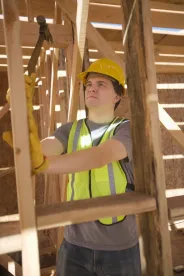This week the New Jersey Appellate Division issued its Order and Opinion in the case of Collins v. PJW Servs., 2021 N.J. Super. Unpub. LEXIS 1556. Plaintiffs owned a home in Haddonfield, New Jersey, and wanted to add an extension, including a second story. Plaintiffs retained the services of an architect to design the architectural plans, bid the project, and to oversee construction. To perform the actual work, Plaintiffs hired PJW Services (PJW).
Shortly after construction commenced, Plaintiffs noticed water leaks in their garage and brought this issue to the attention of their builder on December 12, 2010. As most contractors do, PJW assured Plaintiffs the leak was insignificant since the roof work was still ongoing. PJW further advised that once the roof was sealed, the leak would no longer be a problem. Unfortunately for Plaintiffs, that was not the case.
Construction on Plaintiffs’ home was completed in May 2011. According to Plaintiffs, they did not experience or notice any further leaking until 2014, when they noticed discolored and wet sheetrock in their newly renovated two-car garage. For reasons unknown, Plaintiffs waited until July 2017 to file suit against PJW and their architect. Plaintiffs asserted numerous causes of action including, but not limited to, breach of contract, consumer fraud violations, and breach of warranties. After responding to Plaintiffs’ complaint, the architect filed a motion seeking to have Plaintiffs’ claims dismissed for failing to file their complaint within the time provided by New Jersey’s Statute of Limitations.
Under New Jersey’s Statute of Limitations, a construction-defect lawsuit must be filed within six years from the time that the plaintiff first knew or, through the exercise of reasonable diligence, should have known of the basis for a cause of action. However, because more often than not construction defects are hidden and not readably observable, New Jersey has adopted what is referred to as the “discovery rule” for construction defect actions. The discovery rule is an equitable doctrine meant to lessen the harsh and sometimes draconian effects of the Statute of Limitations. This tolls, or in other wordsstops the limitations clock until a plaintiff is able to discover through the exercise of reasonable diligence, the facts that form the basis for an actionable claim. Beyond the Statute of Limitations, New Jersey also has a ten-year Statute of Repose. The Statute of Repose, unlike the Statute of Limitations, has no tolling provisions. It is a hard deadline that begins to run at the time of “substantial completion.” After ten years, all construction defect claims will be barred by the statute. “Substantial completion,” as referenced in New Jersey’s Statute of Repose, is generally achieved when a certificate of occupancy is issued, and the structure is ready for use.
In the case of Collins, the trial court incorrectly determined that Plaintiffs’ claims were barred by the six-year Statute of Limitations, finding that the Plaintiffs’ knew “there was some issue” during construction and therefore determined the that the Statute of Limitations began to run on December 12, 2010, the date Plaintiffs first confronted PJW regarding the water leaks. As a result of this finding, the trial court determined Plaintiffs failed to assert their claims within the Statute of Limitations period and therefore were barred.
Plaintiffs appealed the trial court’s order to the New Jersey Appellate Division, which ultimately disagreed with the trial court’s findings. In reversing the trial court’s order, the Appellate Division ruled that Plaintiffs did not have a cause of action, and therefore, the Statute of Limitations did not begin to run until 2014, when they discovered the discolored and wet sheetrock in their garage. Most significantly, the Appellate Division held that Plaintiffs could not have filed their claim in 2010 as it would have been premature prior to substantial completion.
Notably, the words “substantial completion” are not contained in the language of New Jersey’s Statute of Limitations, but rather can be found in New Jersey’s Statute of Repose. Essentially, the Appellate Division in Collins, adopted the language of “substantial completion” from the Statute of Repose to mark the earliest point in which a potential plaintiff could bring a construction defect action. As the Appellate Division explained, “[a] cause of action could not accrue . . . at an earlier date because a civil action for a defect or deficiency prior to substantial completion would, of necessity, be dismissed as premature because a builder is entitled to the entire period prior to substantial completion to rectify any defects in the design or construction before being sued.”
At the end of the day, what does this mean for potential plaintiffs? For better or worse, it forces homeowners to grin and bear it through, perhaps a miserable construction experience, in the hopes that the contractor or designer will correct any issues or defects identified prior to substantial completion. However, once substantial completion occurs and the contractor’s right to rectify the issues has expired, the clock will begin to run.
If you are a homeowner and/or live in a community association and have concerns about ongoing construction, don’t wait to bring in counsel years later. Every day counts when the clock is ticking.



 />i
/>i

